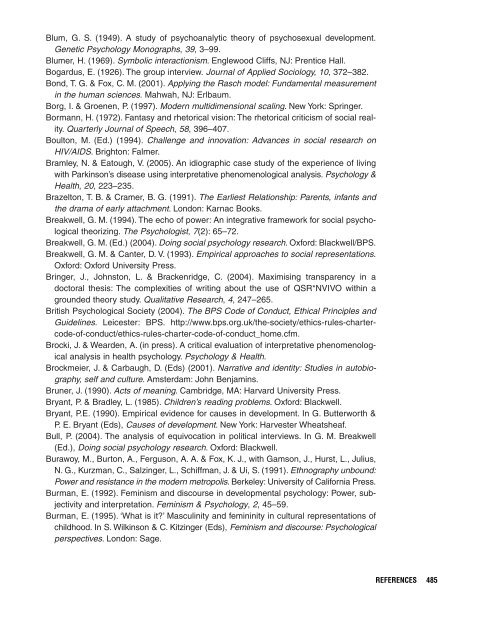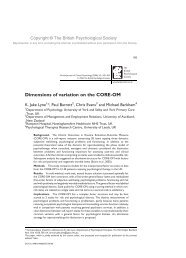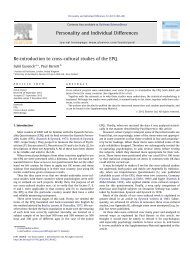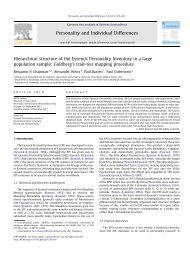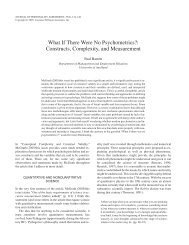Psychophysiological Methods - Paul Barrett
Psychophysiological Methods - Paul Barrett
Psychophysiological Methods - Paul Barrett
- No tags were found...
You also want an ePaper? Increase the reach of your titles
YUMPU automatically turns print PDFs into web optimized ePapers that Google loves.
Breakwell-3389-Reference.qxd 2/7/2006 9:03 PM Page 485Blum, G. S. (1949). A study of psychoanalytic theory of psychosexual development.Genetic Psychology Monographs, 39, 3–99.Blumer, H. (1969). Symbolic interactionism. Englewood Cliffs, NJ: Prentice Hall.Bogardus, E. (1926). The group interview. Journal of Applied Sociology, 10, 372–382.Bond, T. G. & Fox, C. M. (2001). Applying the Rasch model: Fundamental measurementin the human sciences. Mahwah, NJ: Erlbaum.Borg, I. & Groenen, P. (1997). Modern multidimensional scaling. New York: Springer.Bormann, H. (1972). Fantasy and rhetorical vision: The rhetorical criticism of social reality.Quarterly Journal of Speech, 58, 396–407.Boulton, M. (Ed.) (1994). Challenge and innovation: Advances in social research onHIV/AIDS. Brighton: Falmer.Bramley, N. & Eatough, V. (2005). An idiographic case study of the experience of livingwith Parkinson’s disease using interpretative phenomenological analysis. Psychology &Health, 20, 223–235.Brazelton, T. B. & Cramer, B. G. (1991). The Earliest Relationship: Parents, infants andthe drama of early attachment. London: Karnac Books.Breakwell, G. M. (1994). The echo of power: An integrative framework for social psychologicaltheorizing. The Psychologist, 7(2): 65–72.Breakwell, G. M. (Ed.) (2004). Doing social psychology research. Oxford: Blackwell/BPS.Breakwell, G. M. & Canter, D. V. (1993). Empirical approaches to social representations.Oxford: Oxford University Press.Bringer, J., Johnston, L. & Brackenridge, C. (2004). Maximising transparency in adoctoral thesis: The complexities of writing about the use of QSR*NVIVO within agrounded theory study. Qualitative Research, 4, 247–265.British Psychological Society (2004). The BPS Code of Conduct, Ethical Principles andGuidelines. Leicester: BPS. http://www.bps.org.uk/the-society/ethics-rules-chartercode-of-conduct/ethics-rules-charter-code-of-conduct_home.cfm.Brocki, J. & Wearden, A. (in press). A critical evaluation of interpretative phenomenologicalanalysis in health psychology. Psychology & Health.Brockmeier, J. & Carbaugh, D. (Eds) (2001). Narrative and identity: Studies in autobiography,self and culture. Amsterdam: John Benjamins.Bruner, J. (1990). Acts of meaning. Cambridge, MA: Harvard University Press.Bryant, P. & Bradley, L. (1985). Children’s reading problems. Oxford: Blackwell.Bryant, P.E. (1990). Empirical evidence for causes in development. In G. Butterworth &P. E. Bryant (Eds), Causes of development. New York: Harvester Wheatsheaf.Bull, P. (2004). The analysis of equivocation in political interviews. In G. M. Breakwell(Ed.), Doing social psychology research. Oxford: Blackwell.Burawoy, M., Burton, A., Ferguson, A. A. & Fox, K. J., with Gamson, J., Hurst, L., Julius,N. G., Kurzman, C., Salzinger, L., Schiffman, J. & Ui, S. (1991). Ethnography unbound:Power and resistance in the modern metropolis. Berkeley: University of California Press.Burman, E. (1992). Feminism and discourse in developmental psychology: Power, subjectivityand interpretation. Feminism & Psychology, 2, 45–59.Burman, E. (1995). ‘What is it?’ Masculinity and femininity in cultural representations ofchildhood. In S. Wilkinson & C. Kitzinger (Eds), Feminism and discourse: Psychologicalperspectives. London: Sage.REFERENCES485


